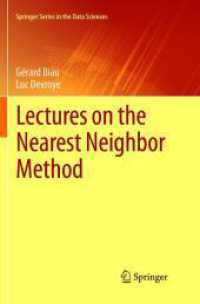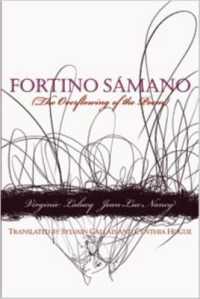- ホーム
- > 洋書
- > 英文書
- > Philosophy
Full Description
Axel Honneth is widely regarded as one of the most important contemporary critical theorists. His oeuvre, which spans more than four decades of writing—from his early engagement with critique in the Frankfurt School tradition to his theory of recognition and the latest discussions of freedom in modern ethical life and the question of socialism—has been enormously influential in the shaping of current critical theory and beyond. Bringing together leading scholars in contemporary social and political philosophy, this authoritative book takes the central themes of Honneth's work as a starting point for debating the present and future of critical theory as a form of socially grounded philosophy that is geared toward analyzing and critiquing society.
Honneth's writings revolve around five key themes: critique, recognition, freedom, progress, and socialism. His arguments engaging with each of these themes have substantially advanced current debates in critical theory and social and political philosophy more generally. The contributing authors take on these five themes and use them as a springboard to structure their discussion of the future of critical theory in our contemporary moment.
Contents
Julia Christ, Kristina Lepold, Daniel Loick, Titus Stahl: Debating Critical Theory. An Introduction
Section I: Critique
Chapter 1: Raymond Geuss: Realism, Yet Again
Chapter 2: Rainer Forst: Kantian Republicanism vs. the Neo-Republican Machine: The Meaning and Practice of Political Autonomy
Chapter 3: Sally Haslanger: Taking a Stand: Second-Order Social Pathologies or First-Order Critique
Chapter 4: Martin Saar: Immanent Normativity and the Fact of Domination: Notes on "Immanent Critique"
Chapter 5: Didier Fassin: Moral Economy - A Critical Reappraisal
Chapter 6: Robin Celikates: Radical Civility. Social Struggles and the Domestication of Dissent
Section II: Recognition
Chapter 7: Frederick Neuhouser: Rousseau on the Nature of Social Inequality
Chapter 8: Martin Hartmann: Repressive Empathy? A Plea for Contextualization
Chapter 9: Joel Whitebook: On Human Sociability
Section III: Social Freedom
Chapter 10: Bruno Karsenti: Ethical Life and Anomy. From Social Philosophy to Sociology of the St







